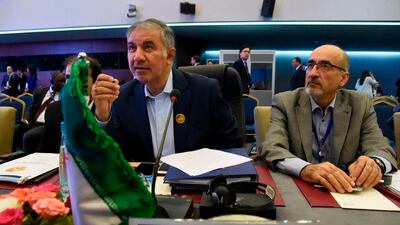Iran won't effect much change during Opec’s sub-committee meeting in the Algerian capital this week, even as it threatened to veto any decision that opposes its national interests, analysts said.
“Unfortunately for Iran, this is as good as a done deal, because the Saudis and the Russians have agreed to do things this way,” said Vandana Hari, Singapore-based analyst at energy consultancy Vanda Insight.
On Thursday, Iranian oil minister Bijan Zanganeh told state petroleum news agency Shana and Bloomberg that Iran would veto any decision by Opec and its allies, that could threaten its ability to get oil to market at a time when its output is being increasingly restricted by US sanctions.
Opec’s sub-committee is expected to discuss output quotas in Algeria on Monday, a decision Iran has termed “illegal”.
Last week, Opec secretary general Mohammed Barkindo told reporters in Fujairah that the organisation looked to ease concerns of all its producers.
However, analysts suggest Iran’s clout may be far eclipsed by the growing proximity between Saudi Arabia and Russia, two of the world’s largest sovereign producers.
“Iran is neither Opec president at the moment, which is the UAE, nor the the joint JMMC [Joint Ministerial Monitoring Committee] president which is Saudi Arabia and Russia,” said Iman Nasseri, managing director, Middle East at London-based Facts Global Energy.
_______
Read more:
Iran threatens Opec on decisions it says hurt its interests
Sri Lanka stops import of Iranian oil ahead of sanctions
Trade wars and falling Iran exports to impact supply and demand, says Opec
________
“No one has significant clout except Saudi. They have the largest spare capacity and largest production [capacity]. Whoever produces more has higher say,” he added.
However, Ms Hari suggested that the Saudi-Russian leadership of the grouping may be amenable to extending an olive branch to Iran given its difficulties getting oil to the market, similar to the flexibility allowed to Tehran during production cuts in 2017.
"They may hold out an olive branch – by not making any changes to Iran’s quota for the time being,” said Ms Hari.
"In any case, the 1 million barrels per day boost agreed in June was to offset the declines from Venezuela, Angola and Mexico. It doesn’t eat into Iran’s market share. “Opec+ will have to ratchet up production much beyond that to offset the losses from Iran,” she added.
Both analysts suggested that Iran exiting Opec due to frustrations with the grouping was a strong possibility but a choice it was unlikely to make.
However, Tehran, which had earlier relied on Russian and Venezuelan support to back up its arguments in the group is increasingly sidelined by the growing Riyadh-Moscow ties.
“There were a few price hawks at the June 22-23 meeting, who were not too keen on making any changes in the production restraints in place. But they have been quiet since and are unlikely to support Iran,” said Ms Hari.


